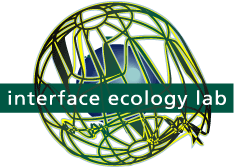
Organization Description
The Interface Ecology Lab is a research lab committed to transforming the computing landscape by increasing participation, creativity, expression, and social cohesion. We believe that computing is powerful, but that it is crucial to interject essential human values into the processes of development and utilization. Computing can serve destruction and domination, or it can support humanity. We choose a human-centered approach.
Why We Want to Participate in Summer of Code
The Interface Ecology Lab has two primary connected goals that we hope to achieve through participation in GSoC 2012: realize a vision of development of open source infrastructure supporting human experiences with interactive information, and expand the community involved in using this infrastructure. We want to push forward the development of these projects whose transformative potential we are so excited about. We want to expand utilization and participation of the software so the benefits impact the world more broadly, and to broaden the scope of participation in the design process, as well. We are driven by a human-centered vision of computing and information in service to humanity. We seek community through participation in GSoC.
Support for Information Mapping in Programming Languages (S.IM.PL) is our multi-tiered initiative to develop cross-platform support for information-centric application development in popular programming languages, such Java, C++, C#, Python, and JavaScript. S.IM.PL Serialization is a cross-platform, multi-format framework for data serialization. It currently supports, XML, JSON, TLV, and BibTex formats. The key features are an in-line metalanguage and the encapsulation of the semantics of serialization in optimized, portable data structures called translation scopes.
S.IM.PL also includes a new, efficient and easy to use web services framework, Object Oriented Distributed Semantic Services (OODSS). OODSS services are more efficient and easier to develop than SOAP-based web services. They can be used, for example, for real time games, as well as information-centric web sites like GMail. S.IM.PL serialization is used to serialize messages for OODSS transmission. Inappropriate messages are automatically rejected. To elimnate hard-to-maintain case statements, errors handling code is handled by inline metadata augmented error message classes, which possess their own service methods, isolated from regular cases.
The third component of S.IM.PL is meta-metadata. Meta-metadata is a language and architecture for authoring application-independent wrappers for representing metadata semantics for heterogeneous information sources in collection-representation applications. The semantics address a metadata life cycle including strongly-typed data structures of arbitrary complexity, information extraction from web pages and services, semantic action scripting to perform operations, and presentation to users. The growing library of wrappers represents sources including popular search engines, Wikipedia, Flickr, Urban Spoon, the ACM Digital Library, and CiteSeer. The goal is to make it easy to develop applications that operate on complex metadata from diverse sources.
Finally, we are developing open source software libraries for multi-touch interaction. Multi-touch has enormous potential to transform how people interact with information, embodying the process and making the experience more expressive. These libraries also generalize support for utilization of Cypress Semiconductor's Programmable System on a Chip (PSOC), in conjunction with sensor arrays.